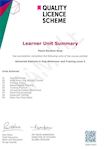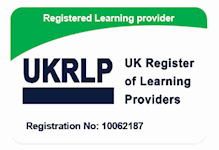- Exam(s) / assessment(s) is included in price
- TOTUM card available but not included in price What's this?
Diploma in Neuro- Linguistic Programming Training - Level 3 Certification
Free E - Certificate Included | CPD & IAP Accredited | Access for 365 days | No Hidden Fee
Study365
Summary
Overview
Neuro-linguistic programming refers to non-verbal communication. It is a system that will help you master communication techniques, and how to use communication that makes a difference. You will learn to communicate with yourself that will help change your feelings, attitude and mindset. If NLP interests you on a deeper level, and you want to expand your knowledge in it, the Diploma in Neuro-Linguistic Programming Training – Level 3 ticks all of the boxes.
The course will address the tools to analyse and modify the behaviour sequence observed in someone else. These tools refer to the internal and external communication of a person and how the aspect of programming operates on how the neurology (brain) works. If you have a desired outcome in mind, then you can apply the NLP language that is required to achieve this outcome. The Diploma in Neuro-Linguistic Programming will give you the opportunity to explore how this works.
The Diploma in Neuro-Linguistic Programming Training – Level 3 will address key topics such as the introduction to NLP and the roles and responsibilities of a Neuro-Linguistic Practitioner. Gaining a certificate in this field will open the door to exciting employment opportunities and the chance to work for an established educational institute in the role of Neuro-Linguistic Practitioner, Counsellor or Mentor, or even take the steps to set up your own practice.
The course has been endorsed under the Quality Licence Scheme. This means that Global Edulink* has undergone an external quality check to ensure that the organisation and the courses it offers, meet defined quality criteria. The completion of this course alone does not lead to a regulated qualification* but may be used as evidence of knowledge and skills gained. The Learner Unit Summary may be used as evidence towards Recognition of Prior Learning if you wish to progress your studies in this subject. To this end the learning outcomes of the course have been benchmarked at Level 3 against level descriptors published by Ofqual, to indicate the depth of study and level of demand/complexity involved in successful completion by the learner.
The course itself has been designed by Global Edulink* to meet specific learners’ and/or employers’ requirements which cannot be satisfied through current regulated qualifications. the Quality Licence Scheme endorsement involves robust and rigorous quality audits by external auditors to ensure quality is continually met. A review of courses is carried out as part of the endorsement process.
*Study365 is an approved reselling partner for Quality Licence Scheme courses under Global Edulink
*Regulated qualification refers to those qualifications that are regulated by Ofqual / CCEA / Qualification Wales
Achievement
Course media
Description
Learning Outcomes
- Gain insight into a range of NLP techniques and tools.
- Learn how individuals can achieve success through the NLP system.
- You will learn to understand and relate to your clients, and yourself.
- Understand how personality develops, and different personality traits of your clients.
- Learn how to change perceptions that can facilitate change around you.
Course Curriculum
1: Introduction To Neuro-Linguistic Programming
2: Understand The History Of Nlp
3: Understand The Role Of A Neuro-Linguistic Practitioner
4: What Are Four Pillars Of Wisdom
5: The Presuppositions Of Nlp
6: What Is Rapport
7: Perception Of The World Versus Reality
Access Duration
The course will be directly delivered to you, and you have 12 months access to the online learning platform from the date you joined the course. The course is self-paced and you can complete it in stages, revisiting the lectures at any time.
Method of Assessment
This online course is assignment-based with learners being assessed upon the submission of a series of assignments. Once you successfully submit the assignments, students will gain a professional qualification. The assignments must be submitted to the instructor through the online learning portal. The assignments will be reviewed and evaluated, with feedback provided to the student on how well they have fared.
Certification
At the end of this course successful learners will receive a Certificate of Achievement from the Quality Licence Scheme and a Learner Unit Summary (which lists the components the learner has completed as part of the course).
Course Code: QLS-05044
Accredited Body
Accredited body (Accreditation) the Quality Licence Scheme has long-established reputations for providing high quality vocational qualifications across a wide range of industries. the Quality Licence Scheme combines over 180 years of expertise combined with a responsive, flexible and innovative approach to the needs of our customers.
Renowned for excellent customer service, and quality standards, the Quality Licence Scheme also offer regulated qualifications for all ages and abilities post-14; all are developed with the support of relevant stakeholders to ensure that they meet the needs and standards of employers across the UK.
Who is this course for?
- Individuals with basic experience and understanding of NLP
- Existing practitioners and Life Coaches
- Anyone with a desire to become a neuro-linguistic programming coach
- Therapists, Teachers, Managers, Health Professionals
Requirements
- Learners should be age 19 or over, and must have a basic understanding of Maths, English, and ICT.
- A recognised qualification at level 2 or above in any discipline
Career path
- Therapist – £32,071 per annum
- Healthcare Administrator – £18,402 per annum
- Life Coach – £24,566 per annum
- Teacher – £28,002per annum
- Counsellor
Others jobs you can get
- Practitioner
- Mentor
- Healthcare Worker
Questions and answers
Currently there are no Q&As for this course. Be the first to ask a question.
Reviews
Currently there are no reviews for this course. Be the first to leave a review.
Legal information
This course is advertised on reed.co.uk by the Course Provider, whose terms and conditions apply. Purchases are made directly from the Course Provider, and as such, content and materials are supplied by the Course Provider directly. Reed is acting as agent and not reseller in relation to this course. Reed's only responsibility is to facilitate your payment for the course. It is your responsibility to review and agree to the Course Provider's terms and conditions and satisfy yourself as to the suitability of the course you intend to purchase. Reed will not have any responsibility for the content of the course and/or associated materials.
FAQs
Interest free credit agreements provided by Zopa Bank Limited trading as DivideBuy are not regulated by the Financial Conduct Authority and do not fall under the jurisdiction of the Financial Ombudsman Service. Zopa Bank Limited trading as DivideBuy is authorised by the Prudential Regulation Authority and regulated by the Financial Conduct Authority and the Prudential Regulation Authority, and entered on the Financial Services Register (800542). Zopa Bank Limited (10627575) is incorporated in England & Wales and has its registered office at: 1st Floor, Cottons Centre, Tooley Street, London, SE1 2QG. VAT Number 281765280. DivideBuy's trading address is First Floor, Brunswick Court, Brunswick Street, Newcastle-under-Lyme, ST5 1HH. © Zopa Bank Limited 2024. All rights reserved.







